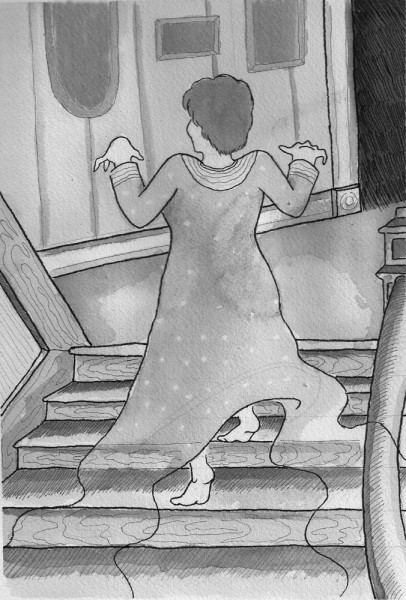Everyone agreed that we’d survived the accident, from the police officers who pulled us from the wreckage to the emergency room doctors that bandaged up our scrapes and scratches. But my mother could not be convinced. “We weren’t even wearing seatbelts,” she’d insist. “There’s just no way.”
Our survival was improbable, but I tried to remind her that improbable things happen all the time. “That’s the stupidest thing I ever heard,” she said, and went back to writing her obituary. “Maybe you survived,” she allowed. “But I’m definitely dead.” My father spoke up, finally, asking why she was still hanging around and talking over the game if she was really so dead—oh, dad. “I must have unfinished business,” she said, “or perhaps you need to avenge me before I can rest.”
The next night, I rose to go to the bathroom and found her shuffling around the upstairs hallway in the dark. “What are you doing?” I asked. “Haunting you,” she said, giggling, and then she skittered away, her housecoat fluttering behind her like a jet of diaphanous ectoplasm. And when I called home the next day to check on her, she had changed her outgoing voicemail message. “I’m sorry; I can’t come to the phone right now—I’m dead. Please leave condolences after the beep.”
The trauma counselor advised us to play along—this will run its course, he said. But in death, my mother seemed at peace with herself in a way she never had been in life. The supermarket no longer filled her with dread, and she paid no mind to the judging eyes of those around her.
“I’m already dead,” she’d say. “What difference does any of it make?”
And so when she took to the second floor balcony to wail into the night like a banshee, I answered our incredulous neighbors simply, and without embarrassment. “Because my mother’s a ghost, that’s why.”



 The core workshop of SmokeLong Fitness is all in writing, so you can take part from anywhere at anytime. We are excited about creating a supportive, consistent and structured environment for flash writers to work on their craft in a community. We are thrilled and proud to say that our workshop participants have won, placed, or been listed in every major flash competition. Community works.
The core workshop of SmokeLong Fitness is all in writing, so you can take part from anywhere at anytime. We are excited about creating a supportive, consistent and structured environment for flash writers to work on their craft in a community. We are thrilled and proud to say that our workshop participants have won, placed, or been listed in every major flash competition. Community works.